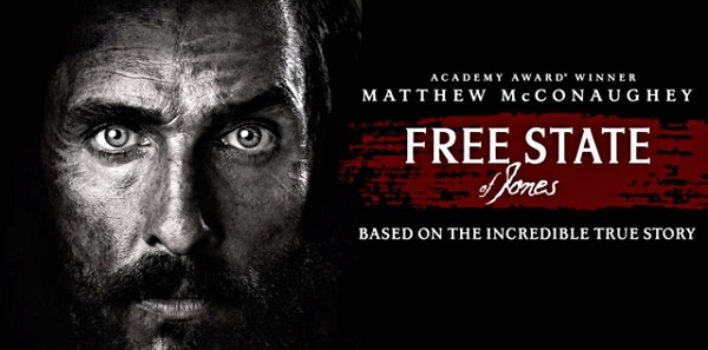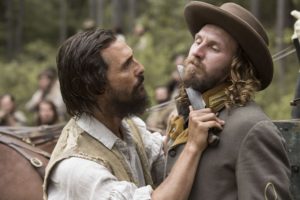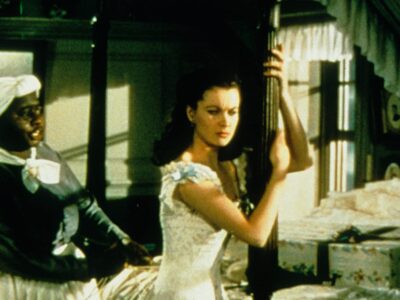Review| Free State of Jones: You Cannot Own a Child of God
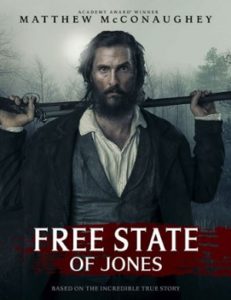 Stories surrounding American war history are common among yearly blockbusters. We typically see one or two tent-pole war films with major releases every year, and those are usually focusing on the three major wars in U.S. History: The Revolutionary War for Independence, The Civil War, and World War II. Diving further still into those wars, we usually have some pretty common threads in war films. Typically one soldier or one company is followed and the story is told from their perspective. Often they’re focused on one mission and the climax of the film revolves around the success or failure of that mission. This year, Gary Ross (Hunger Games, Plesantville) ventures to tell the story of Newton Knight, a deserting confederate soldier fighting his own battle while the country at large fights for it’s own soul.
Stories surrounding American war history are common among yearly blockbusters. We typically see one or two tent-pole war films with major releases every year, and those are usually focusing on the three major wars in U.S. History: The Revolutionary War for Independence, The Civil War, and World War II. Diving further still into those wars, we usually have some pretty common threads in war films. Typically one soldier or one company is followed and the story is told from their perspective. Often they’re focused on one mission and the climax of the film revolves around the success or failure of that mission. This year, Gary Ross (Hunger Games, Plesantville) ventures to tell the story of Newton Knight, a deserting confederate soldier fighting his own battle while the country at large fights for it’s own soul.
Matthew McConaughey stars in this civil war film as the rebellious Newton Knight, a poor farmer who decides to stop fighting for the right of rich people to own slaves. Faced head on with the brutality of war, Knight abandons his company and flees back to his farm where he finds confederate soldiers pillaging civilians, levying a “tax” which allegedly goes to support the war effort. When discovered as a deserter, Knight is forced to hide in the swamp near his farm. It is here he meets a small group of runaway slaves and discovers that, at least in the eyes of the confederacy, he is no different from them. Well, except that the confederacy still views him as an actual person. Therein lies one of the things I personally found wanting in this film. Knight relates personally to the runaway slaves and there appears to be no racism in him. This is a good challenge to our perception of confederate soldiers. It’s easy to assume everyone fighting for the south owned or wanted to own slaves and was racist purely by geography. Knight’s story challenges that assumption, but it seems stop shy of taking his view to it’s end. He sees himself as the same or similar to the slaves, but he fails to see how the confederacy distinguishes them aside from the mere ownership of them. In one scene of a stirring speech by Knight he nearly reaches it, but alas it falls short. It’s a shame too, because from this scene comes a terrific tagline: “You cannot own a child of God”. Even this line only goes to explain Knight’s view of slavery without facing, or at least without fully embracing and explaining the hard truth behind how the confederacy viewed African Americans; not merely as not children of God, but not people at all. This line and other sporadically placed readings of and references to scripture would have made this a very solid religious/spiritual tale.
Progressing from his initial encounter with slaves in the swamp, and realizing that he is not so different from them in many ways, Knight begins gathering other confederate deserters and runaway slaves. Initially the effort is to stop the confiscation of civilian property, but eventually this becomes a larger effort aimed at the very intentions of the confederacy. Small raiding parties lead to skirmishes with confederate troops, which leads to Knight’s “army” holding control over a handful of counties in Mississippi, Jones County being at the epicenter of it all. After seeking aid from Union forces and receiving very little, Knight declares the territories they have won to be a “Free State of Jones”, complete with their own declaration of rights. An interesting move in this film is that it doesn’t just stop there with a moving declaration, fade to black and on-screen text describing the success or failure of this movement. Rather, we continue following Knight after the war and well into reconstruction. It is here the film again misses the heart. We have two central characters acting as our connection into the life of a slave. One, Moses (Mahershala Ali, Hunger Games: Mockingjay) is a runaway slave who takes up arms with Knight. When the war ends he is reunited with his family and begins lobbying for black voting rights. The other, Rachel (Gugu Mbatha-Raw, Concussion) is a house slave for a rich cotton-farmer who often sneaks away to aid Knight and his company. During reconstruction the Free State of Jones is eventually disbanded and joined into the larger United States. This would have been a perfect time to shift the focus of the film away from Knight and onto one or both of these characters, but instead we mostly see their experiences through Knight. It’s like the potential is there to make a greater emotional connection, and in many ways the characters are built with the foundation to handle it, but the steps aren’t taken to fully embrace it. Because of that I think this film misses a larger impact it could have potentially had.
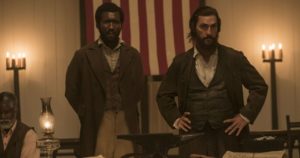 This was a film I was heavily looking forward to at the beginning of the year. The story of Newton Knight is immediately compelling due to it’s unique nature and challenging perceptions. Unfortunately this film leaves a lot on the table and left me feeling somewhat uninspired. Additionally, there was a story telling element that Ross decided to include which involved Knight’s family 85 years into the future as they dealt with segregation. So the connection is evident, race relations were still bad even 3-4 generations past the war, but this is time that would have been better spent on a deeper emotional appeal of the characters in question rather than a half-hearted attempt at telling the audience something they already know.
This was a film I was heavily looking forward to at the beginning of the year. The story of Newton Knight is immediately compelling due to it’s unique nature and challenging perceptions. Unfortunately this film leaves a lot on the table and left me feeling somewhat uninspired. Additionally, there was a story telling element that Ross decided to include which involved Knight’s family 85 years into the future as they dealt with segregation. So the connection is evident, race relations were still bad even 3-4 generations past the war, but this is time that would have been better spent on a deeper emotional appeal of the characters in question rather than a half-hearted attempt at telling the audience something they already know.
The real heart of this story is in the tagline, “You cannot own a child of God.” I’m not sure of Knight’s real-life religious beliefs, but if there was anything there at all this would have been a terrific point to drive him rather than become a bumper sticker style slogan in a speech. All of us, regardless of skin color, are created in the image of God. Because of that Christians maintain that all people are equally valuable in God’s sight and we must conform to that in our treatment of one another. There is the potential for a lot of spiritual depth in this story. Unfortunately it falls short of most opportunities to reach that depth.


